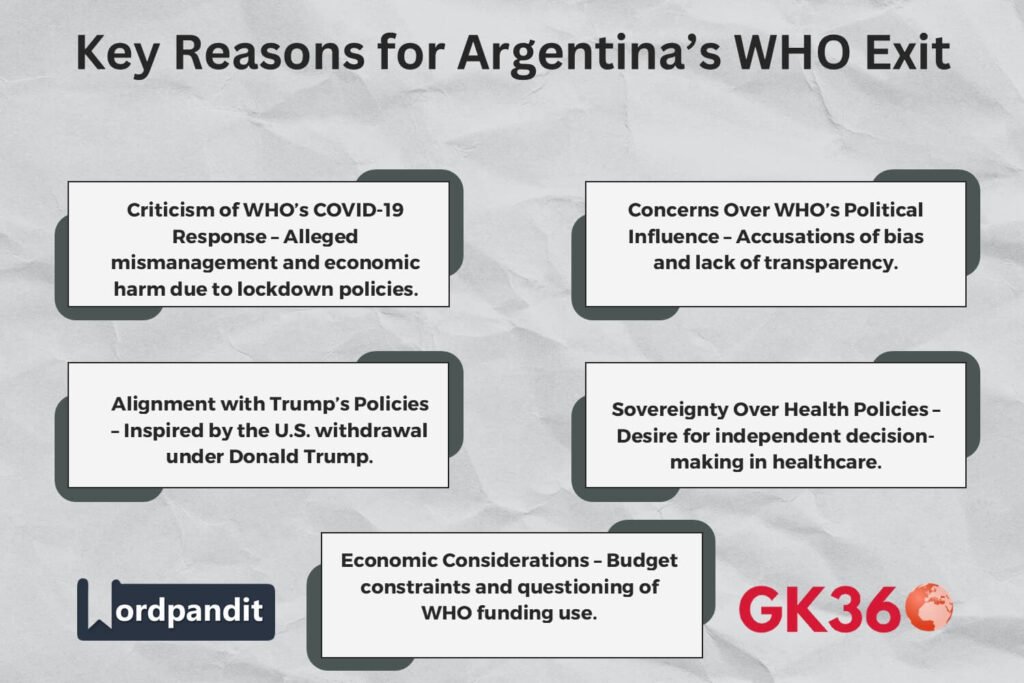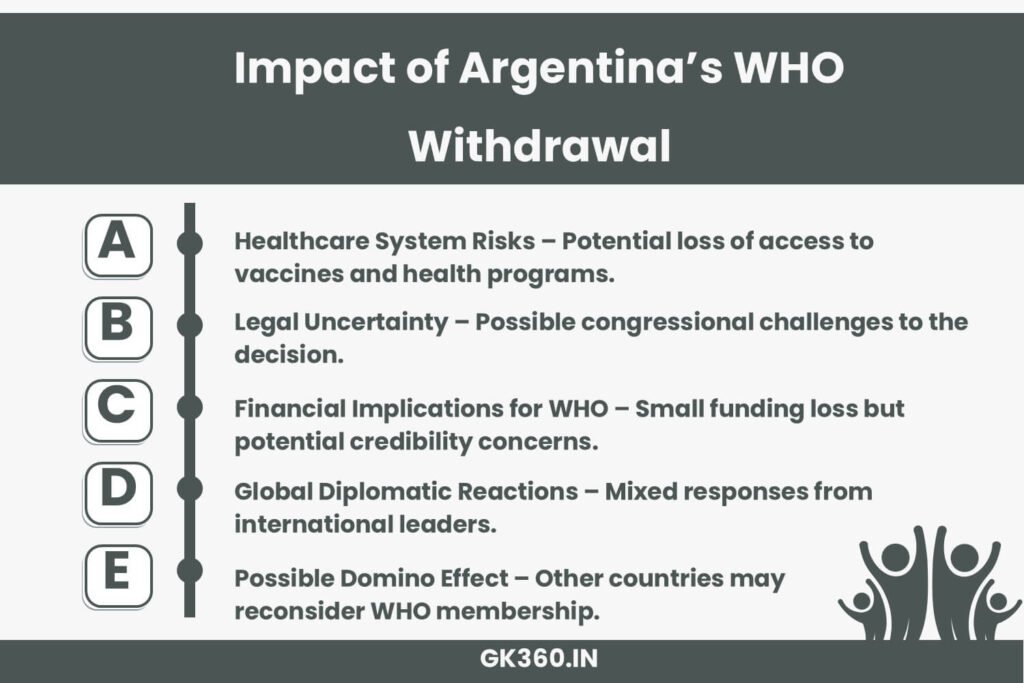Argentina’s WHO Exit: Reasons, Impact, and Global Reactions
Introduction
In a surprising move that has sent shockwaves through global health and diplomacy, Argentina has announced its withdrawal from the World Health Organization (WHO). President Javier Milei’s administration justified the decision by citing the WHO’s alleged mismanagement of global health policies, particularly during the COVID-19 pandemic. The withdrawal aligns Argentina with the United States, which similarly exited the WHO under former President Donald Trump.
This unprecedented step raises critical questions: What does this mean for Argentina’s healthcare system? Will other nations follow suit? How will this affect WHO’s credibility? While supporters argue it is a necessary move to reclaim national sovereignty over healthcare decisions, critics warn of severe consequences, including restricted access to essential medicines, vaccines, and global health funding.
In this article, we explore the reasons, legal hurdles, healthcare impact, and global responses to Argentina’s exit from the WHO.

Table of Contents
- Why Did Argentina Withdraw from WHO?
- Argentina’s Exit and Its Alignment with the US
- Legal and Healthcare Implications
- How Will Argentina’s Exit Affect WHO?
- Global and Domestic Reactions
- Summary of Argentina’s WHO Exit (Quick Key Facts Table)
- FAQs on Argentina’s WHO Withdrawal
- Conclusion (What’s Next for Argentina and the WHO?)
Why Did Argentina Withdraw from WHO?
Argentina’s decision to withdraw from the WHO marks a pivotal shift in its approach to global health governance. The administration of President Javier Milei has outlined several key reasons for this move, citing ideological, political, and practical disagreements with the organization.
Government’s Official Reasons
During a press conference, presidential spokesperson Manuel Adorni confirmed that Argentina would initiate the exit process from the WHO. Foreign Minister Gerardo Werthein has been tasked with overseeing the withdrawal, following a directive from President Milei. The government argues that:
- Argentina’s membership in the WHO is no longer beneficial.
- National healthcare policies should be dictated by domestic priorities rather than global mandates.
Criticism of WHO’s COVID-19 Response
One of the Milei administration’s core grievances is the WHO’s handling of the COVID-19 pandemic. The government accuses the WHO of:
- Inconsistent guidance on lockdown measures, which allegedly harmed Argentina’s economy.
- Failure to prevent misinformation about COVID-19 treatments and responses.
- Lack of transparency in coordinating global vaccine distribution.
The Milei administration believes that the extended lockdowns imposed by Argentina’s previous left-wing government were influenced by WHO recommendations, exacerbating the country’s economic crisis.
Concerns Over WHO’s Political Influence
Beyond pandemic-related concerns, President Milei has also criticized the WHO’s political alignment with dominant global powers. His administration claims that the WHO:
- Favors certain geopolitical interests, particularly those of the United Nations’ most influential members.
- Lacks financial accountability, with critics arguing that member states receive little say in budget allocations.
- Interferes with national healthcare policies, limiting the sovereignty of individual governments.
The Milei government sees Argentina’s withdrawal as a step toward reclaiming control over healthcare decisions, independent of international influence.
Argentina’s Exit and Its Alignment with the US
Argentina’s decision to withdraw from the WHO closely mirrors the actions of former U.S. President Donald Trump, who withdrew the United States from the WHO during his second term in January 2025. President Javier Milei has been open about his admiration for Trump’s policies, particularly regarding international institutions, and has taken several steps to align Argentina’s foreign policy with that of the United States’ conservative leadership.
Milei’s Admiration for Trump’s Policies
President Milei has frequently praised Trump’s “America First” approach, advocating for a reduction in Argentina’s reliance on global organizations that he believes undermine national sovereignty. His administration argues that Argentina should prioritize domestic decision-making over international guidelines dictated by organizations such as the United Nations (UN), WHO, and the International Monetary Fund (IMF).
Key reasons for this alignment include:
- Shared skepticism of multilateral organizations like the WHO, which Milei and Trump view as bureaucratic and inefficient.
- Criticism of global health governance, particularly regarding the WHO’s COVID-19 response.
- Desire to reduce international obligations, allowing for more independent healthcare and trade policies.
Trump’s WHO Withdrawal: A Precedent for Argentina
Trump’s decision to officially withdraw the United States from the WHO in January 2025 set a precedent for Milei’s move. In both cases, the governments argued that:
- The WHO failed to manage the COVID-19 pandemic effectively.
- The organization lacks transparency and accountability.
- The financial contributions made by wealthy member states were being misallocated.
While the United States was the WHO’s largest financial contributor (providing nearly $950 million annually, or 15% of the total WHO budget), Argentina’s financial contributions were much smaller ($8 million annually). However, Argentina’s withdrawal is symbolically significant, as it signals a broader political shift that could influence other nations.
Legal and Healthcare Implications
Does the Decision Require Congressional Approval?
While Argentina’s withdrawal from the WHO has been publicly announced, several legal concerns could delay or even block the decision.
Critics argue that Argentina’s WHO membership is part of national law, meaning that withdrawal may require congressional approval rather than a unilateral executive decision. Opposition leaders have vowed to challenge the withdrawal in court, raising questions about whether:
- Legislative approval is needed to exit the WHO.
- Existing healthcare agreements tied to WHO membership could create legal obstacles.
- Argentina’s constitution allows the president to unilaterally sever ties with international organizations.
If legal challenges succeed, Argentina may face delays or even be forced to remain in the WHO despite Milei’s intentions.
Potential Consequences for Argentina’s Healthcare System
Leaving the WHO could have far-reaching implications for Argentina’s public healthcare system. Critics warn that the withdrawal could result in:
- Loss of access to WHO-supported medical programs, including vaccination initiatives, disease prevention efforts, and emergency healthcare aid.
- Restricted participation in global health partnerships, reducing Argentina’s influence in international healthcare policy.
- Difficulties in responding to future pandemics, as the WHO plays a key role in coordinating emergency responses and distributing vaccines.
Impact on Argentina’s Public Health Budget
Argentina’s healthcare system is already struggling with budget cuts, as the Milei administration has implemented austerity measures to reduce public spending. Critics argue that leaving the WHO could:
- Increase the cost of vaccines and medicines, as Argentina would lose access to WHO-negotiated pricing deals.
- Limit funding for disease research and medical infrastructure.
- Worsen existing healthcare inequalities, making treatment and prevention programs less accessible for low-income populations.
Despite these risks, Milei’s supporters argue that exiting the WHO will allow Argentina to pursue its own healthcare strategies without external interference.
How Will Argentina’s Exit Affect WHO?
Financial and Credibility Challenges for WHO
Argentina’s withdrawal from the World Health Organization (WHO) is more than just a national policy shift—it raises concerns about the WHO’s credibility, financial stability, and influence. While Argentina’s $8 million annual contribution is relatively small, its decision to leave could set a precedent for other nations considering a similar move.
Potential consequences include:
- Further funding cuts if more nations reconsider their financial support.
- Loss of political influence, as member states challenge WHO’s authority in global health decision-making.
- Reduced cooperation in international health initiatives, making it harder for WHO to coordinate responses to pandemics, vaccine distribution, and public health crises.
Could More Countries Follow Argentina’s Lead?
Several right-leaning governments have criticized the WHO’s handling of the COVID-19 pandemic and questioned its role in shaping national health policies. Some nations that have previously voiced skepticism about WHO policies include:
- Brazil (under former President Jair Bolsonaro, who threatened to leave the WHO).
- Hungary (where Prime Minister Viktor Orbán has pushed for more national control over healthcare).
- Italy (where nationalist parties have opposed global health mandates).
If other nations perceive WHO as ineffective or politically biased, Argentina’s withdrawal could spark a domino effect, weakening WHO’s ability to enforce global health initiatives.
Global and Domestic Reactions
Criticism from Opposition Leaders and Healthcare Experts
Argentina’s decision has sparked intense debate at home, with opposition leaders and healthcare professionals warning of potential risks:
- 🚨 Jeopardizing Argentina’s public health infrastructure, particularly for low-income and rural communities.
- 💊 Complicating access to vaccines, medical supplies, and international health research.
- 🌍 Harming Argentina’s global reputation, making it harder to secure diplomatic and economic partnerships.
Critics argue that blindly following Trump’s policies could destabilize Argentina’s healthcare system, which has already been strained by economic downturns and budget cuts.
However, Milei’s supporters argue that leaving the WHO will allow Argentina to make independent healthcare decisions, free from global bureaucratic interference.
International Concerns Over WHO’s Future
Global health experts and world leaders have expressed concerns that Argentina’s withdrawal could weaken international health cooperation.
Reactions from key stakeholders:
- WHO Officials: Expressed disappointment, stating that Argentina’s departure could limit global efforts to combat future pandemics.
- United Nations (UN): Warned that turning away from multilateral institutions could set a dangerous precedent for global governance.
- European Union (EU): Criticized the move as short-sighted, arguing that international health crises require collaboration, not isolation.
Some analysts believe that Argentina’s exit, coupled with the U.S. withdrawal, will force the WHO to undergo structural reforms to regain global trust.
Summary of Argentina’s WHO Exit (Quick Key Facts Table)
| Aspect | Details |
|---|---|
| Reason for Exit | Criticism of WHO’s COVID-19 response, political concerns, and financial considerations. |
| Government Justification | President Milei argues for national sovereignty over health policies. |
| Legal Implications | Congress may challenge the decision, delaying or blocking the withdrawal. |
| Healthcare Risks | Loss of WHO-backed programs, increased vaccine costs, and limited emergency health aid. |
| WHO Impact | Minor financial loss but significant reputational concerns. |
| International Reactions | Mixed responses; critics warn of weakened global health cooperation. |
| Future Outlook | Argentina’s decision may encourage other countries to reconsider WHO membership. |
FAQs on Argentina’s WHO Withdrawal
1️⃣ Can Argentina rejoin the WHO in the future?
Yes. If a future administration decides to reverse the withdrawal, Argentina could reapply for membership, similar to how the U.S. can reconsider its position under a new government.
2️⃣ Will Argentina’s withdrawal affect global healthcare programs?
Not directly in financial terms, but it raises concerns about WHO’s influence and credibility, potentially encouraging other nations to exit.
3️⃣ How does this impact Argentina’s healthcare system?
Argentina may face challenges in accessing WHO-backed vaccines, disease prevention programs, and emergency medical aid. The decision could also increase healthcare costs.
4️⃣ Why did Trump and Milei both withdraw from WHO?
Both leaders criticized WHO’s handling of the COVID-19 pandemic, its political neutrality, and the lack of transparency in financial decisions.
5️⃣ Could more countries leave the WHO after Argentina?
Possibly. Some right-leaning governments have expressed skepticism about WHO policies, and Argentina’s move might encourage other nations to reconsider their membership.
Conclusion: What’s Next for Argentina and the WHO?
Argentina’s withdrawal from the WHO represents a major geopolitical shift, reflecting President Javier Milei’s broader strategy of distancing the country from multilateral institutions. By following Donald Trump’s lead, Argentina is embracing a nationalist approach to global governance, favoring domestic control over international collaboration.
However, this decision is not without risks. Legal challenges could delay or block the withdrawal, and the healthcare system may suffer from reduced access to vaccines, funding, and emergency response programs. Meanwhile, the WHO must address its credibility crisis, as Argentina’s departure could influence other nations to reassess their membership.
Ultimately, the coming months will determine the full impact of Argentina’s WHO exit—both domestically for its healthcare system and globally for the future of international health governance.
Related Terms:
- Argentina WHO Exit
- Javier Milei WHO decision
- Argentina healthcare sovereignty
- WHO credibility crisis
- Global health governance
- WHO funding concerns
- COVID-19 WHO criticism
- Political influence in WHO
- International health policies
- Future of WHO membership






